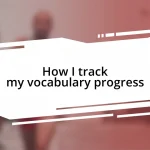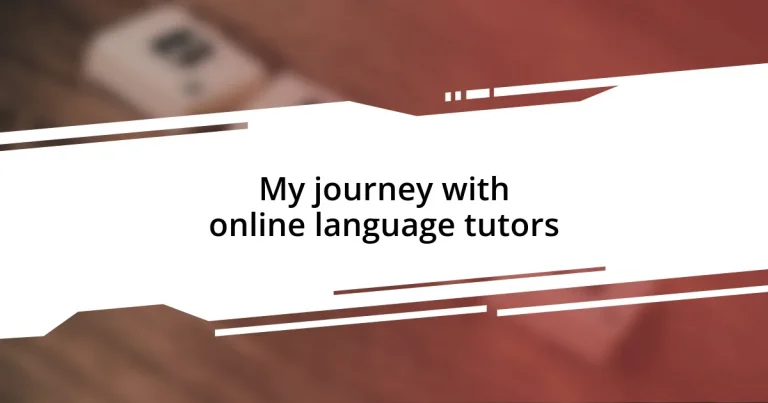Key takeaways:
- Tutor personality and flexibility are crucial for effective learning; a connection enhances engagement and understanding.
- Setting clear, specific learning goals helps structure progress and boosts motivation through manageable milestones.
- Effective communication with tutors, including sharing challenges and giving feedback, personalizes the learning experience.
- Utilizing diverse language resources, such as apps and conversation platforms, enriches learning and supports practical application.
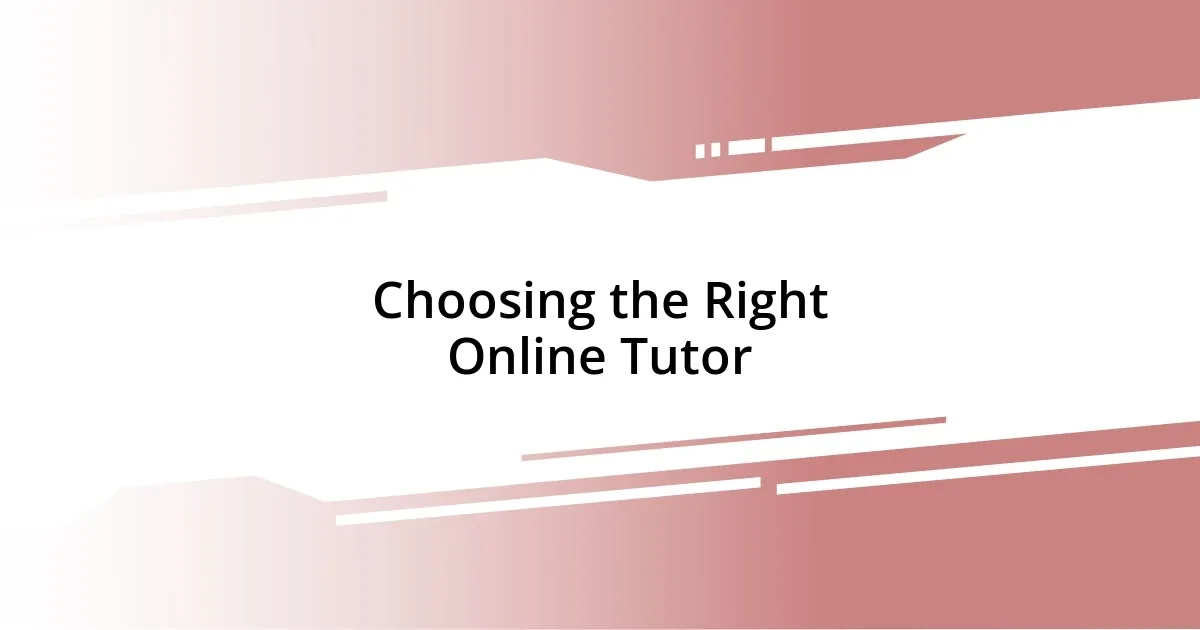
Choosing the Right Online Tutor
Choosing the right online tutor can feel overwhelming at first, especially with so many options available. I remember sifting through countless profiles, trying to decipher who would truly understand my learning style. Have you ever wondered what makes a tutor the right fit for you?
For me, the personality of the tutor played a crucial role. I once had a tutor who was incredibly knowledgeable but had a very rigid teaching style. I found myself disengaged and often frustrated. It made me realize that not only should they have the necessary skills, but they also need to establish a connection that makes learning enjoyable.
Another important factor is the tutor’s availability and flexibility. I once had a tutor who scheduled sessions late at night to accommodate my busy schedule. It was a game-changer! I learned better during those times, and the flexibility took away the stress of fitting tutoring into my life. What’s your schedule like, and how important is it for you to have a tutor who can work around it?

Setting Clear Learning Goals
Setting clear learning goals is foundational in my journey with online language tutors. When I began, I made the mistake of jumping into lessons without a concrete plan. But once I established specific objectives, like mastering verb conjugations or expanding my vocabulary, the learning became more focused and productive. Have you ever set a goal and felt that rush of achievement when you reached it? It’s incredibly motivating.
I recall one instance when I aimed to hold a 5-minute conversation entirely in Spanish by the end of the month. Breaking that down into smaller goals like practicing different topics each week did wonders. It made the lessons manageable and even enjoyable. The sense of accomplishment I felt each time I hit a milestone was priceless—it encouraged me to keep pushing my limits.
Additionally, I found that revisiting these goals regularly with my tutor helped us stay aligned. It was enlightening to discuss progress with my tutor and adjust our strategy when needed. This reflective practice not only made my learning experience more interactive but also reinforced my commitment to my goals.
| Learning Goal | Description |
|---|---|
| Short-term | Aim for conversational phrases in specific scenarios, such as ordering food. |
| Medium-term | Expand vocabulary to include 100 new words related to hobbies and interests. |
| Long-term | Achieve fluency with the ability to hold a 30-minute conversation on various topics. |
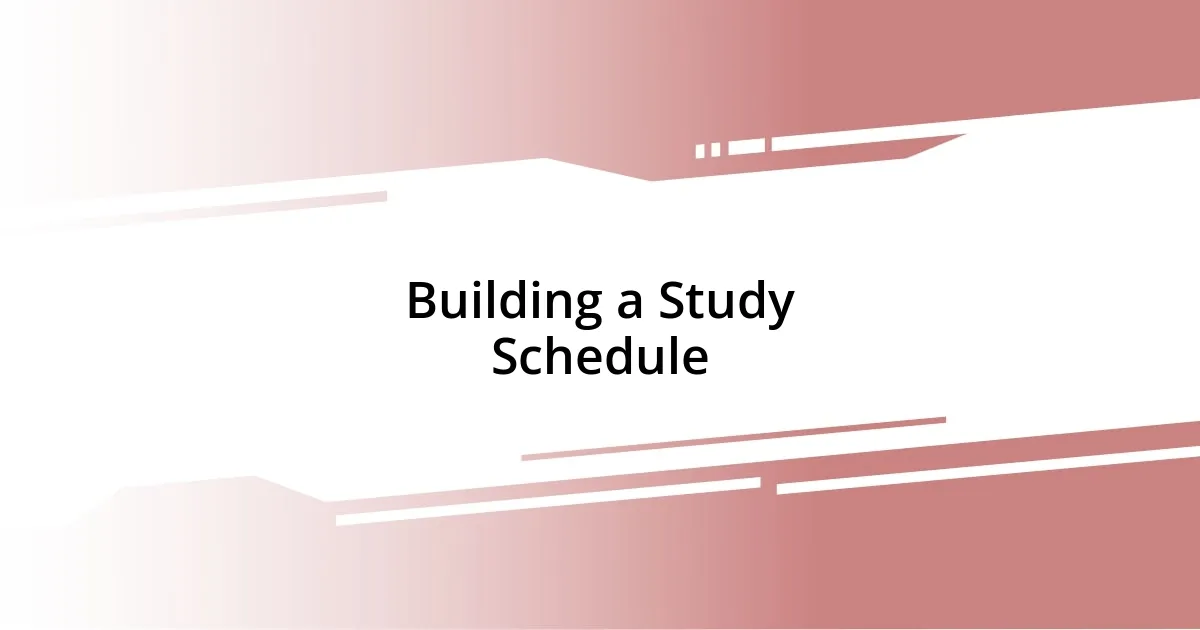
Building a Study Schedule
Building a study schedule is essential for making the most out of my online tutoring sessions. When I first started, I felt overwhelmed by all the resources available and the topics I wanted to cover. What really helped was setting aside specific times for each lesson and sticking to a consistent routine. Establishing a rhythm in my study habits created a sense of accountability, and I found myself looking forward to my sessions as a key part of my day.
Here’s how I structured my study schedule:
- Weekly Overview: Each Sunday, I would plan out my week, allocating specific days for grammar, pronunciation, and vocabulary.
- Consistent Timing: I chose mornings for my lessons when my mind was fresh, taking advantage of that clarity.
- Short Breaks: Between lessons, I scheduled short breaks to recharge, allowing me to absorb what I learned without feeling overwhelmed.
- Flexibility for Adjustments: I built in some time to review or catch up on topics, ensuring my schedule remained adaptable as new interests or challenges arose.
I can still recall the boost in confidence when I saw how my routine helped me make steady progress. Each well-structured session brought me closer to achieving my goals, reinforcing my passion for learning. How do you envision incorporating a study schedule into your language learning journey?
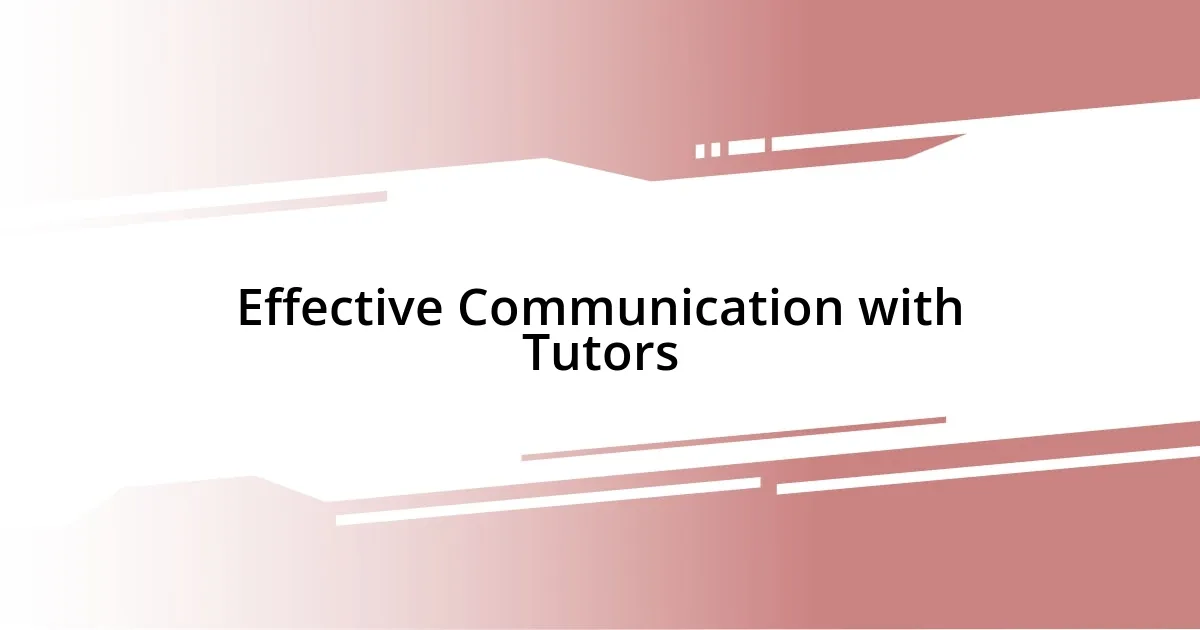
Effective Communication with Tutors
Effective communication with tutors can truly transform your learning experience. In my journey, I discovered that being open about my strengths and weaknesses made all the difference. For instance, I once shared my struggle with pronunciation, which allowed my tutor to tailor exercises specifically for me. It felt like a breath of fresh air—suddenly, I was working on my exact needs instead of wading through generic material. Have you ever felt stuck with a tutor because you didn’t express your challenges? I know I have, and it was such a relief to break that barrier.
Listening actively during our sessions became another game-changer. I began to realize that asking questions not only clarified my doubts but also sparked deeper discussions. There was this one time when I asked about the cultural significance behind certain phrases. That single question opened up a lively conversation and gave me insights I hadn’t considered before. It was those moments that really brought the language to life for me. Don’t you think those deeper conversations could make your language learning feel more meaningful?
Moreover, I learned the importance of feedback—both giving and receiving it. After a lesson, I would share what worked well and what could be improved. This dialogue helped shape our future sessions. I remember one moment where I expressed that certain vocabulary drills felt monotonous. My tutor responded by introducing engaging games that not only broke the routine but also made learning feel more dynamic. It felt empowering to be a part of my learning journey. How do you typically communicate your needs and feedback during tutoring sessions?
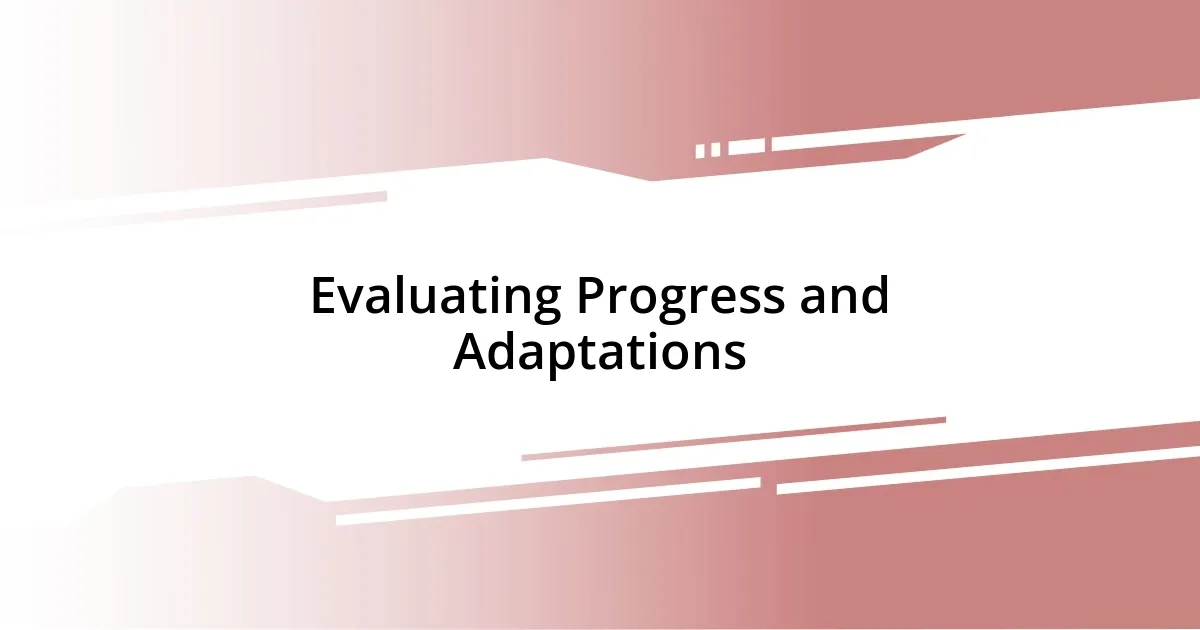
Evaluating Progress and Adaptations
Evaluating progress during my language learning journey was incredibly rewarding. I made it a point to periodically assess my skills, looking back at what I learned and how I had improved. One particular moment sticks out to me: after a few months of consistent tutoring, I tried to have a conversation with a native speaker. The exhilaration I felt when I could express my thoughts without constantly hesitating was monumental—it was a clear indicator of my progress.
Adapting my learning plan based on these evaluations was just as crucial. For instance, I began noticing that my vocabulary was growing faster than my speaking fluency. Rather than sticking to a general framework, I pivoted to incorporate more conversational practice. I specifically recall a week where I focused solely on dialogue-based lessons. The shift not only leveled up my speaking skills but also enhanced my confidence. Have you had to adapt your learning style based on your growth? It’s a vital aspect of personalizing your language journey.
Moreover, feedback from my tutor was a significant part of my evaluation process. After each session, my tutor would provide insights on how I could improve, which led to tangible adjustments in our focus areas. I remember one lesson where I received constructive criticism about my intonation. That feedback motivated me to pay closer attention, leading to noticeable changes in my delivery. Reflecting on those insights helped me see what worked and what didn’t, inspiring me to take charge of my learning. How do you interpret feedback from your tutors?
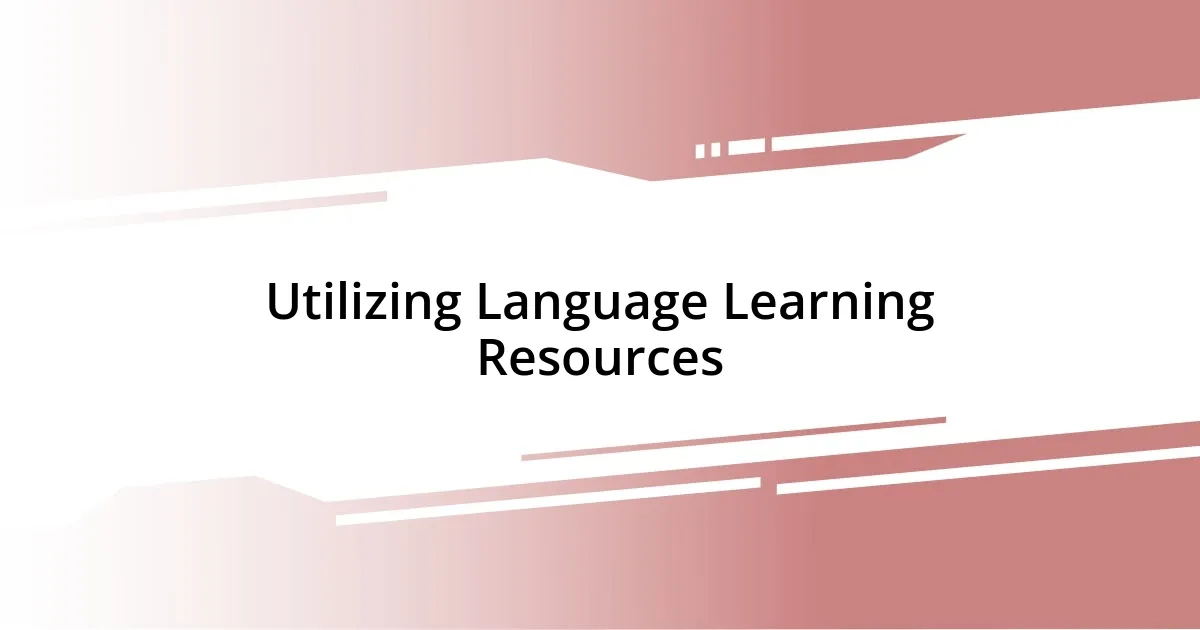
Utilizing Language Learning Resources
Once I discovered various language learning resources, my journey took on a whole new dimension. From mobile apps to online forums, each resource offered unique benefits. For example, I often turned to language exchange platforms where I could connect with native speakers. It felt surreal to converse with someone across the globe, sharing not just the language but also cultural experiences. Have you tried engaging with peers online? There’s something incredibly motivating about learning from each other’s successes and challenges.
In addition to conversation practice, I made use of educational videos and podcasts. I specifically remember tuning into a podcast that highlighted different idiomatic expressions each week. I often paused the episode to jot down examples and practice them aloud. This method didn’t just help with vocabulary; it made me more aware of the context in which phrases are used. Isn’t it fascinating how insights from everyday conversations can really enhance your language skills?
Moreover, I learned to utilize interactive exercises available online to reinforce my understanding. There was a time I stumbled upon a website featuring gamified quizzes. The thrill I felt when unlocking levels not only made me curious to learn more but also turned studying into a fun challenge. It’s moments like these that remind me how enjoyable the learning process can be. How do you integrate different resources into your own language learning? Balancing various tools can help cultivate a more comprehensive understanding.

Sharing Experiences and Tips
Sharing experiences and tips about my journey with online language tutors has been a game-changer for me. One lesson that really stood out was when my tutor encouraged me to keep a language journal. I remember the first time I wrote a short paragraph entirely in the language I was learning—I felt a rush of excitement and pride. Keeping that journal not only supported my writing skills but also helped me track my evolution. Have you ever felt that thrill of seeing your progress in written form?
Another valuable tip is to create a comfortable learning environment. I’ve found that leaning into my surroundings can impact my mood and focus. In one instance, I set up my study space with soothing colors and plants. The moment I opened my laptop for a tutoring session, it felt like I was entering a personal learning haven. That mental shift made a significant difference in how engaged I was during lessons. What kind of space enhances your learning experience?
Lastly, don’t underestimate the power of establishing a connection with your tutor. Early on, I made it a point to share more about my interests and goals. That conversation turned our sessions from mere lectures to lively discussions, enriching my experience immensely. I still cherish that personal rapport; it created a sense of accountability that motivated me. Have you ever developed a similar bond with your tutor that transformed your learning dynamic?










